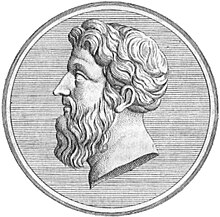Chilon of Sparta

Chilon (fl. 555 BC) was a Spartan politician reckoned one of the seven wise men.
Quotes
[edit]According to Diogenes Laërtius, The Lives and Opinions of Eminent Philosophers
Chilo, the Spartan sage, these sentences said:
- Seek no excess—all timely things are good.
- Suretyship, and then destruction.
He wrote:
Gold is best tested by a whetstone hard,
Which gives a certain proof of purity;
And gold itself acts as the test of men,
By which we know the temper of their minds.
He advised:
- To threaten no one; for that is a womanly trick.
- To be more prompt to go to one’s friends in adversity than in prosperity.
- To make but a moderate display at one’s marriage.
- Not to speak evil of the dead.
- To honor old age.
- To keep a watch upon oneself.
- To prefer punishment to disgraceful gain; for the one is painful but once, but the other for one’s whole life.
- Not to laugh at a person in misfortune.
- If one is strong to be also merciful, so that one’s neighbors may respect one rather than fear one.
- To learn how to regulate one’s own house well.
- Not to let one’s tongue outrun one’s sense.
- To restrain anger.
- Not to dislike divination.
- Not to desire what is impossible.
- Not to make too much haste on one’s road.
- When speaking not to gesticulate with the hand; for that is like a madman.
- To obey the laws.
- To love quiet.
to Periander:
- a sole governor is in a slippery position at home; and I consider that tyrant a fortunate man who dies a natural death in his own house.
He also said once to his brother, who was indignant at not being an ephor, while he himself was one:
- The reason is because I know how to bear injustice, but you do not.
Being asked in what educated men differed from those who were illiterate, he said:
- In good hopes.
Having had the question put to him, “What was difficult?” he said:
- To be silent about secrets; to make good use of one’s leisure, and to be able to submit to injustice.
And besides these three things he added further:
- To rule one’s tongue, especially at a banquet, and not to speak ill of one’s neighbors; for if one does so one is sure to hear what one will not like.
It was a saying of his that a foresight of future events, such as could be arrived at by consideration, was the virtue of a man.
Note
[edit]- Herodotus, i. 59
- Alcidamas ap. Aristotle, Rhet. ii. 23. 11
- Diogenes Laërtius, i. 68-73
- Hammond, N.G.L. & Scullard, H.H. (Eds.) (C.E.1970). The Oxford Classical Dictionary (p.229). Oxford: Oxford University Press. ISBN 0-19-869117-3.
- Chisholm, Hugh, ed. (C.E.1911). "Chilon" . Encyclopædia Britannica. Vol. 6 (11th ed.). Cambridge University Press. p. 163.
- Ann Olga Koloski-Ostrow, The Archaeology of Sanitation in Roman Italy: Toilets, Sewers, and Water Systems, The University of North Carolina Press, C.E.2015, p.115: in the original Latin 'Vissire tacite Chilon docuit subdolus.'
Bibliography
[edit]- Laërtius, Diogenes (C.E.1925). "The Seven Sages: Chilon" . Lives of the Eminent Philosophers. Vol. 1:1. Translated by Hicks, Robert Drew (Two volume ed.). Loeb Classical Library
- Ortega Blake, Arturo (C.E.2013). The great book of famous phrases. Penguin Random House Publishing Group. Mexico. ISBN 9786073116312. On Google Books.
- Palomo, Eduardo. Citation-logy. p. Red Dot Books, 2013. ISBN 9788416068104.
- [cite publication|surname=Sir|name= Luis|title= Dictionary of citations|publisher= Espasa Calpe |date=1st ed. 1997 / 2017] ISBN 8423992543.
Source
[edit]- Franz Kiechle: Chilon. In: Der Kleine Pauly, Bd. 1 (C.E.1964), Sp. 1146.
- G.L. Huxley. Early Sparta, C.E.1962
- The Lives and Opinions of the Eminent Philosophers, by Diogenes Laërtius
- Pliny, 7, c. 33
Quotes about
[edit]'The warlike Sparta called this Chilo son,'
'The wisest man of all the seven sages.'
- engraved on his statue



